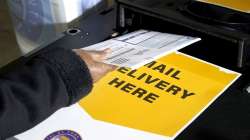EXPLAINER: On US Election Day, patience a necessary virtue
Americans in the 21st century aren’t always the most patient of people — and a deeply anticipated nail-biter of a 2020 election is certainly no exception.

Americans in the 21st century aren’t always the most patient of people — and a deeply anticipated nail-biter of a 2020 election is certainly no exception. Nevertheless, counting votes accurately for an entire nation, in an election whose jurisdiction is divided up state by state, can be a cumbersome process.
EXPECTATIONS AND REALITY
“One of the biggest things that I would encourage people to do today is to have patience,” says Pace, a longtime political and White House correspondent. “There’s no expectation that we would definitely call the race for the presidency on election night. We call it when the votes are there and the math tells us we can.”
IS THAT UNUSUAL?
No. “That’s not the setup that we’ve ever had in this country,” Pace says. Multiple American presidential elections — not just the most famous one, George W. Bush vs. Al Gore in 2000 — have not produced immediate results, as unsatisfying as that can be for a society that now expects immediate delivery of everything from consumer goods to TV shows to news updates.
WHAT’S UNIQUE HERE?
The amount of votes cast in advance, paired with rules in some states that those votes can’t be counted until Election Day, are part of what make 2020 different.
“What’s different this year is that there will be a significant chunk that won’t be counted immediately,” Pace says. “In a close race, tabulating more of that mail-in vote that’s coming in still is going to be even more important. So that could be the simple reason why a count is slow.”
WORTH REPEATING
Says Pace on the results: “We always have to have patience, to wait until enough votes to come in to have clarity.”
ALSO READ | What to watch on Election Day in America. An Insight
ALSO READ | Huge voter turnout expected in US election despite pandemic